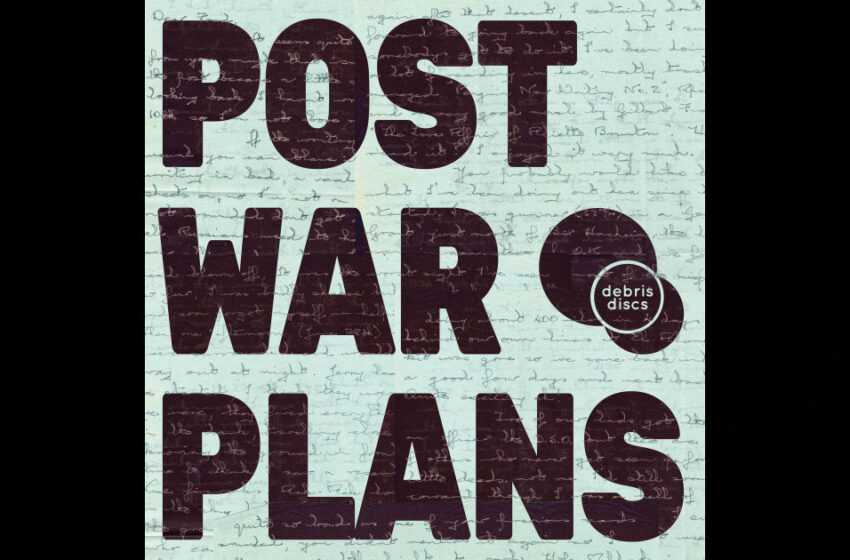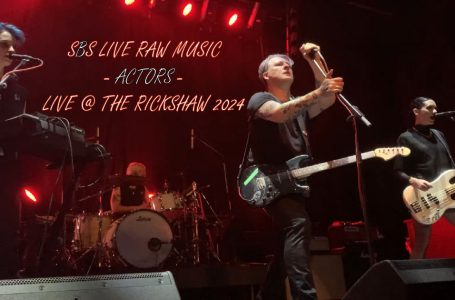Debris Discs – Post War Plans

Debris Discs – Post War Plans – Album Review
Definitely an interesting project to learn about…it’s clear that solo-artist James Eary puts a lot of effort & thought into all that he does in Debris Discs, from the concepts driving the material, straight into the execution and finished tunes you’ll hear on Post War Plans. From what I’ve read, much of this album is “inspired by recently discovered letters my Grandpa wrote to his brother while fighting in WW2” – which is one of many cool things influencing the tunes throughout this record…that kind of idea reminds me a bit of After The War by Sleep Station. Then there’s the fact that you can trace some of this material all the way back to something like two decades ago…there’s a track on this album called “Dear Fred” that had James digging through the archives to reclaim some of his old ideas and make them more relevant for right now by reworking them into new songs. Heck, even the equipment he’s using throughout this recording sparked my interest too! Eary didn’t necessarily opt for the latest & greatest – he decided to continue using many of his old analog synths and a whole bunch of tech that dates back a fair ways – and a lot of what he created for Post War Plans was made in Garageband. Deciding that everything was clearly too easy (I’m kidding) in the process so far, he recorded somewhere around a minimum of FORTY vocal tracks (not kidding) for the majority of the songs you’ll hear. Dude’s clearly dedicated to the art of making music, and for what it’s worth, it sure sounds like it has paid off throughout this entire set-list.
It starts a bit on the sleepy side of sound with “Holes In My Mind” easing us into the record. With a hazy & dreamy combination of light sparkling synth & low-end vibes, I felt like “Holes In My Mind” delivered on a favorable first impression while not really revealing the entire scope of this project all in the initial experience too. I really liked Eary’s vocals right off the bat, and I felt like the lyricism kept me attentive as well. Hooks-wise, I feel like “Holes In My Mind” ended up finding something more memorable than we’d perhaps give this song credit for in the first couple of spins through the album. The more you tour through Post War Plans, the more you’ll appreciate “Holes In My Mind” I figure. By comparison to much of the lineup to follow, it probably pales a bit to be truthful, but I never felt opposed to its inclusion. I think it can be crucial to give a great record some room to fluctuate, grow, and expand beyond what we hear at first, and “Holes In My Mind” allows for that opportunity to occur. It’s a well-written song when it comes right down to it, but perhaps not quite as naturally accessible as the majority of this lineup will prove to be. Like I said, it took a few spins for me to really feel like I appreciated it as much as I do now.
That’s alright though! I always feel like a quality record will not only grow on you, but with you as well. I’d assume that a track with a bit more of an upbeat vibe like “The Worst Sight That I’ve Seen So Far” will readily catch the attention of additional ears with ease. Think something along the lines of what you hear in the music of Hot Chip with vocals that are similar, but perhaps bend a bit more to that textured sincerity you’d find in a singer like Ed Roland from Collective Soul…that probably gives you a bit of an idea as to what you’ll find. There’s a bit of a Post Punk/New Wave vibe at the core of a song like “The Worst Sight That I’ve Ever Seen So Far” too, in addition to its versatile Pop/Electro influence on the surface…I dig the variation you’ll find in Debris Discs and how that actually leads to consistency overall. As far as the main hooks are concerned here, I think James gets a lot out of the vocals and that’s likely what becomes the biggest draw at first. Sometimes I’d listen to the music surrounding him in the “Fireworks” moments of his chorus and think ‘WTF – how does this actually work at all? Or does it?’ And then there would be moments like around thirty-five seconds in that were truly enticing, or even more towards the end around 2:30 where James creates a seriously fired-up finale to finish this song. If anything, I think he might have left a little on the table when it comes to the chorus when you consider how irresistible that final run through becomes as he shifts gears into a more robust sound at the end. I probably would have been tempted to use that last transition a bit earlier, but I’ll take what I can get.
The title-track from this record has that instantly catchy and welcoming sound that’s sure to get anyone yet to be convinced onboard. Contrast becomes pretty key here on a more in-depth listen to “Post War Plans” and how it deals with such a heavy theme in behind such a noticeably bright and catchy sound. Personally, I love this kind of material. It’s not so much that you’d consider it deceiving, but it’s the kind of song that allows listeners to dig on what they hear in a variety of ways. You can go with what you hear on the surface and appreciate the natural allure of the hooks from the music to the microphone, or if you want, the option is there for you to get right in the trenches and consider the lyricism involved. All-in-all, I think “Post War Plans” stands a great chance of securing a victory with listeners out there – it’s well-conceived material. Short though ain’t it? Like I always tell ya, it’s always a good sign when we want more of what we hear. When it comes to “Post War Plans,” I feel like James could have probably let the music have more of a role in the structure overall – some of the main hooks we find reside there, and adding a bit more instrumental length into this title-track could potentially have been to its benefit. Like, once again, when we get towards the end with less than twenty-seconds to go, you can really hear how the music possesses seriously undeniable hooks that generate massive interest. Allowing us to spend a little more time with those couldn’t have possibly been a bad thing, could it? I don’t think so!
All these good things being said, and I’d still likely tell ya that “Last Battlecry” is the most accessible cut of the first four on Post War Plans. Circling back to that earlier comparison to Collective Soul, you’ll hear that aspect of the melody in Debris Discs come out a bit more through this tune, and ultimately I think that’s a good thing. James is a great singer with a highly expressive voice when it comes right down to it – whether he needs one track or FORTY might be more up for debate – but I really do like what I hear from the guy. Musically, I think it’s clear the guy has got an endless well of ideas to draw from, and the quality is there from production to performance – I’ve got no complaints about anything I’ve heard to this point in the record and feel like Eary’s talent, knowledge, and musicianship has kept this album on solid ground at all times. “Last Battlecry” has a wonderfully dreamy vibe to it that I am fully confident that listeners will absolutely love. Many tunes out there in this world need some kind of written support to sell ya on why you should give’em some of your precious time, and this ain’t one of’em. In my opinion, “Last Battlecry” speaks volumes on its own behalf. Do I think that James is continually holding out on us all a little bit by keeping his main fireworks reserved for the finale of each song we’ve heard so far? You betcha! Of course I do – who wouldn’t feel that way after what they discover in these tunes? That’s my only real advice to the guy…don’t get me wrong, I get the model & design of ramping things up for a memorable ending, but I’m also super greedy about what I listen to, and when I hear the best hooks being revealed with little time left on the clock, I become quickly in favor of moving those pieces further forward. Like…listen to that spot around the 2:50 mark on “Last Battlecry” for example…I think the energy we get from Eary’s vocals there makes for a profoundly moving moment that truly connects.
So…lemme see here. I think when it comes to “Losing The Matriarch,” you’ll probably figure that Debris Discs roams closer to the more recent material you’d find in The Strokes, and I’m all for that personally. That being said, I felt like even though the main hooks/title of this track being sung out loud were definitely memorable, it was the rest of everything around the chorus that stood out the most to me. And that happens sometimes…sometimes we write verses that outshine a chorus ten-to-one, and that doesn’t have to be any kind of bad thing, because it ain’t! I felt like Eary was nothing short of remarkable to listen to as “Losing The Matriarch” started up its first verse – it’s the kind of gateway that has everyone paying close attention, and the second verse to follow is arguably even better! The chorus is gonna do what it does…there’s good solid ear-worm qualities at work there, so I don’t have to advocate on behalf of what’s guaranteed to work already. I can however, RANT AND RAVE about what I hear in the instrumental breakdown around the 1:40 mark, because that’s purely audible awesomeness.
I think it’s fair to say that the material you’ll find on this record is always going to be a bit more personal and meaningful to James, given that it was his own grandfather’s stories & letters that inspired so much of what we hear. In that respect, I don’t expect everything to be quite as engaging or important to us, because we don’t have that same level of personal attachment – make sense? So…in the case of a track like “Convalescent Camp” where you can instantly feel the accessibility that had just reached an all-time high on the previous song completely fade away for this instrumental tune, it does make you wonder a little bit about the choice to include it. Objectively speaking, I don’t know that “Convalescent Camp” really furthers the album overall – and keep in mind, this is coming from the opinion of a guy that actually doesn’t mind what he’s hearing in this tune. I suppose it’s intended to serve a greater purpose by allowing us a moment of reset to refresh our sonic palettes for the upcoming centerpiece of the album in “Dear Fred” – but it really did feel like “Convalescent Camp” also drained a bit of the momentum that Post War Plans had going for it too. So…yeah…I mean, like I was saying, it’s very much possible that “Convalescent Camp” means more to James on another level that we can’t hear it on, and I’d be the first to acknowledge that…but for the rest of us, it’s a little bit sparse. Not a bad tune by any stretch of the imagination, but it’s like an intermission’s interlude in that there ain’t much to it either.
Where things get a bit more complex to assess is again found in that personal connection. For James, “Dear Fred” became the lynchpin and centerpiece of this record – and while I respect that, I’m not sure that’s going to be a shared experience across the board. As I’ve mentioned many times on these pages of ours, the closer the material can be on a personal level, the more opportunity the weight of its own importance can somewhat taint the process and/or results. As in, we tend to get more attached to the ideas and concepts that matter most to us, regardless of whether or not they completely work out as well as we’re hoping they will. Don’t get me wrong, there’s a lot to appreciate about “Dear Fred” as there is in all of the tunes on this record – Eary’s attention to detail has ensured that, and especially on a lyrical level in cases like this one. Do I think there’s enough of a memorable thread in this track that’ll keep the average everyday listener coming back to seek this song out specifically? I’m not nearly as sure about that. It’s a deeper cut in this lineup that I suspect will take some time to grow on listeners in comparison to the higher degree of accessibility found in the set-list of songs surrounding “Dear Fred,” but I do appreciate how much of a role this track ended up playing in inspiring so much of the rest of what we hear on Post War Plans. From what I’ve read, it sure made it seem like without “Dear Fred” we might not have gotten the rest of the album at all…so don’t get me wrong, it served a purpose for sure.
“Letter To Mildred” might dial back the accessibility a little more as the lineup plays on – but again, I still found lots to appreciate. I think you get an exceptional performance out of Eary’s vocals, and the stellar ideas in the music/production show a lot of creativity and innovation too. The attention to detail is quite staggering when you’re really listening to the lefts, the rights, and where things sit in the mix. I felt like “Letter To Mildred” was just missing a little bit of that required spark to be the draw it could potentially be, but that could very well be the way I’m hearing it – I don’t expect us all to share the same opinion. Each individual element added into this song brings something unique to it, and I really dig that – it’s almost borderline theatrical, kind of like what you’d hear in the Pop songs and records by Jellyfish back in the day. Not every one of their tunes reached for accessibility as the main priority either – and I’d never be the guy to argue that should be anyone’s mindset when it comes to songwriting. Do what comes naturally and see where it goes…do what the song is calling out for and you’ll do right by yourself – that’s all that ever matters. If people happen to dig it, then bonus. The chorus felt like Debris Discs was on the right path to finding that magic that would connect this tune to the listeners out there, but like it stopped just a bar or two short from getting there. Like I said, I could easily be wrong about that – you might hear “Letter To Mildred” in a totally different way than I did, and that’s plenty cool with me. I like it…I don’t know that I’d say I’ve yet found a tune that connects quite like the first five on this record did within its second half so far, but I suppose it’s fair to say that “Letter To Mildred” gets the closest. It’s interesting and well-written, and the performance from James is right on the money – the art and the craft shine bright here in my opinion…not every song needs to be about creating catchy hooks y’all.
“Beat Your Neighbour Out Of Doors.” Say what now James? Not everything we’ll ever write is gonna translate to every place across the map…so maybe that’s a Derbyshire saying of some sort, coming from where James is based out of? Who knows? Not a bad tune though. A lot of what Debris Discs creates reminds me of the dreamy vibes I really enjoyed on the self-titled album by Slow Coda from a couple years back…they’d make for a great touring partner, just sayin.’ Anyhow. I don’t know that “Beat Your Neighbour Out Of Doors” is going to be the song that snaps this second-half of the album into place like some listeners will be hoping for by this point, but I also feel like if you’ve been digging what you hear from Debris Discs that you should have no real qualms about enjoying this song too. Is it gonna be your favorite on the record? I don’t know about that per se…but I suppose anything is possible, right? “Beat Your Neighbour Out Of Doors” feels like one of the tunes you’d find on a Bloc Party album that wasn’t quite as lively as the rest of the lineup, where Kele Okereke opted for artistic design and airy melodies over more tangible hooks and a higher level of accessibility. Again, that doesn’t make any track bad – far from it in fact – but it does change how things tend to be received on the other side of the speakers. Where I’ll sit and happily listen to a track like “Beat Your Neighbour Out Of Doors,” I could just as easily hear that it would potentially be the song/point in the record that could have people getting restless.
So…yeah…I think the reality is that Post War Plans becomes a bit sleepier in the material of its second-half in comparison to the first. Not necessarily detrimental of course, but it does shift the record closer to becoming one of those albums that’s a little more mood-dependent, you feel me? You might not always feel like Post War Plans is the album you wanna put on every day, but you’ll know the right mood to be in to give it the quality listen it deserves. “Weekend In Wisbech” would be a perfect example of a song that resonates strongly with me personally, but I wouldn’t expect that assessment to be universal amongst us all. I love what James has done with the guitar in this tune, I love the surrounding synth element set distantly in the mix, and I really think he’s done a stellar job with his vocals & the melody at the core of this tune as well. It’s a SUBTLE gem by every conceivable definition, but it’s mesmerizing y’all. I love when the big drum sounds come in with about a minute to go…in fact, I’d go as far as to say there’s really nothing about “Weekend In Wisbech” that I don’t completely love! It’s oddly hypnotic and soothing in the strangest of ways…but it’s absolutely captivating as well – I couldn’t take my ears off it.
“Hope And The Hospital” has that magic you’re looking for. Still on the most unsuspecting and subtle sides of sound when it comes right down to it, but it does indeed have that special, inspired spark at the heart of it that we’re all seeking out in the music we’re listening to. I might still feel like Eary resembles the dude from Collective Soul when he sings, but musically, I’m swapping out Hot Chip for Lemon Jelly this time around…which for myself, might be an even greater combination. There’s a whole lot of charm and allure in a song like “Hope And The Hospital” – James does an outstanding job of using both sound & space to his advantage on this song. Cleverly paced through the verses, and backed up by sparklingly sweet sentiment & sound along the way…I could definitely see this being one of the more well-received cuts in the lineup on Post War Plans. It’s interesting, it’s beautiful, it’s engaging…it’s kind of all the right things at all the right times in all the right places you wanna find it all happening, you know what I mean? I think it’s gotta be the longest track on the album too at over seven-minutes in length if I’m not mistaken, but you never feel it dragging. If anything, “Hope And The Hospital” feels like it flies right by and soars from start to finish. I was honestly surprised to look up and see this song was as long as it is after hearing it through those first couple spins of the record…it’s got all the feeling of a short Pop song, but the artistic integrity and ambition of something much more involved on every level. Again, it’s not like James is intentionally trying to deceive us, but it’s the same effect…”Hope And The Hospital” will end up being one of the sweetest surprises you’ll find throughout this record, and quite the memorable tune too. In my opinion this song is definitely right up there with the best of the best on Post War Plans.
Ending on a pillow-like cloud of sound with one last instrumental called “Blanco & Bootpolish,” I felt like Debris Discs really put together a highly cohesive and artfully-minded record with Post War Plans. It might be more mood dependent than much of what’s on your playlist, but as I’ve been trying to explain, that can be a great thing. You’ll always know exactly when you feel like listening to an album like this, and every time you reach for it, it’ll provide you with that specific feeling you’re genuinely seeking out. I know I’m impressed. From the concept behind the songs and the album at-large, to the sweetened finale of “Blanco & Bootpolish,” and all of the highlights I’ve pointed out in between the beginning and end, Post War Plans delivered a real experience that removes you out of your own world and places you right in the battlefield on the front lines. I really enjoyed this concept record. So much thought went into the making of these tunes that James should be extremely proud of how it all came out – you can’t miss the attention to detail in the songs, and you can’t miss the meaningful spirit in each of them either.
Find out more about Debris Discs at this multi-link here: https://linktr.ee/DebrisDiscs
You won’t actually READ this message, but imagine a world where you did! You’d know you could be the next up on our pages at sleepingbagstudios by clicking here!






